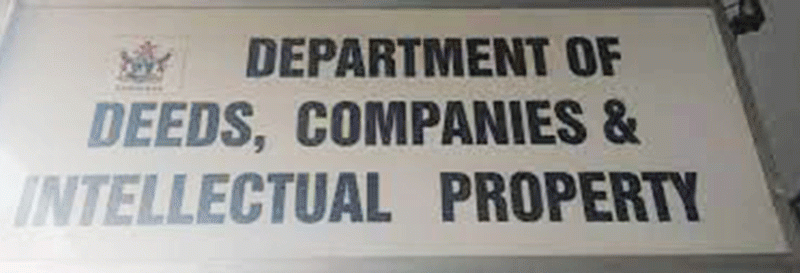
DEED fraud is a significant concern for property owners across the globe, and Zimbabwe is no exception.
The conviction of Prosper Bizwick for forging title deeds for former Education minister Dzingai Mutumbuka’s property exposed vulnerabilities within the Deeds Office. This case illustrates the need for robust mechanisms to protect property owners from title deed scams. Information and Communication Technology (ICT) presents a promising solution.
By implementing search and change alerts, adopting secure digital record-keeping, and employing data analytics, authorities can significantly mitigate the risks associated with title deed fraud.
As highlighted in Mutumbuka’s case, those involved in property management can sometimes betray their responsibilities for personal gain. The alleged collaboration between Deeds Office employees and external fraudsters presents a serious systemic risk.
The long and drawn-out legal battle endured by Mutumbuka demonstrates the emotional, financial, and psychological toll that such fraud can inflict on honest property owners. With systemic corruption and inefficiencies in the legal and policing systems, it has become imperative to explore advanced solutions, including ICT.
ICT solutions for title deed fraud prevention include:
Digital record-keeping
One of the most crucial steps in preventing title deed fraud is transitioning from traditional paper-based record-keeping systems to secure and tamper-proof digital systems. Digital records can be stored using blockchain technology, which ensures data integrity and security. Each transaction related to property ownership can be recorded as a block in the chain, making it nearly impossible to alter ownership details without consensus from all network participants.
- Tarakinyu, Mhandu triumph at Victoria Falls marathon
- Plot to oust ED thickens
- Bread in short supply as bakeries demand US$
- Young vocalist making southern Africa dance
Keep Reading
In Mutumbuka’s case, had the title deeds been secured on a blockchain, unauthorised changes — such as those allegedly executed by Bizwick — would have been immediately evident, as any attempt to modify a property title would require cryptographic validation.
Automated search, change alerts
An essential feature of a digital property registry is the ability to implement automated alerts for property owners. When a change is made to a title deed or any associated documentation, property owners should receive an immediate notification via SMS or email.
This functionality could significantly deter potential fraudsters. For instance, in Mutumbuka’s case, alerts would have informed him of any changes made to his property title, allowing him to take swift action if he suspected foul play. Furthermore, regular searches of property records via a user-friendly online portal could confirm ownership status and identify any suspicious activities.
Secure identity verification
Establishing secure identity verification processes is crucial for preventing unauthorised access to property records. Utilising robust identification methods — such as biometric data and multi-factor authentication — can ensure that only legitimate owners or authorised personnel make changes to property records.
In light of the alleged collusion at the Deeds Office, incorporating advanced identity verification technologies would help ensure that individuals in the office would not manipulate records without proper authorisation.
Data analytics, threat detection
The integration of data analytics into property management systems can enhance the ability to detect unusual patterns that may indicate fraudulent activity. By analysing transaction histories, ownership changes, and other relevant data points, algorithms can help identify potential red flags.
For example, if an individual purchases a property worth US$600 000 for a mere US$40 000 — as occurred in the case of Harrison Marange — it could trigger an alert due to the significant deviation from typical market behaviour. This proactive approach could empower law enforcement to investigate suspicious transactions before they result in fraudulent property transfers.
Public awareness campaigns
While technological solutions are vital, educating Zimbabwe’s property owners about potential scams and the resources available to them is equally critical. Information campaigns demonstrating how to use search and change alerts, as well as how to verify property titles with the Deeds Office, can empower owners to take an active role in safeguarding their investments.
In Mutumbuka’s situation, had he been equipped with knowledge about potential fraudulent activity and the technological tools at his disposal, he might have been able to prevent or mitigate the fraud much earlier.
Conclusion
The case of title deed fraud involving Mutumbuka has shed light on the fragile systems in place to protect property rights in Zimbabwe. To prevent similar situations in the future, it is crucial for the Deeds Office and related entities to adopt advanced ICT solutions.
Digital record-keeping, automated alerts, secure identity verification, data analytics, and public awareness are integral components in the fight against title deed fraud. By leveraging these technologies, Zimbabwe can create a more transparent, secure, and trustworthy real estate environment. Such measures will not only benefit current property owners but can also restore confidence among potential investors, ultimately bolstering the nation’s economy in the face of corruption and fraud.
- Mutisi is the CEO of Hansole Investments (Pvt) Ltd. He is the current chairperson of Zimbabwe Information & Communication Technology, a division of Zimbabwe Institution of Engineers. — +263772 278 161 or [email protected].











